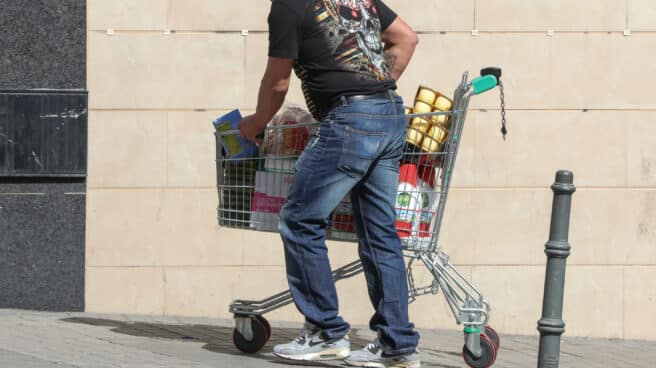

Shopper with a cart in a supermarket.
In Spain, housing has become a “huge financial hole” for three million families as they have to pay more than 63% of your income to cover expenses related to housing, utilities and food.
According to the report “Income and Expenditure: The Equation That Affects Our Quality of Life,” presented by Spanish Caritas And Foessa Foundation on Tuesday, 16.8% of families are below the poverty line seriously once they cover the cost of housing and basic services.
More and more families are forced to resort to formulas such as rooms for sublease (1.2 million households do this) or live in unsafe housing (4.2 million live in communal apartments, transferred without a contract and even in a situation of eviction).
Moreover, the number of families living in inadequate housing that does not meet minimum decent conditions is “alarming.” will increase from 25% in 2018 to 30% in 2021 and will cover 5.6 million families, the analysis warns.
“Many families are faced with something of an insurmountable dilemma: the difficult choice between living in undignified conditions such as divide small spacesfight overcrowding and poor housing conditions or, on the other hand, face economic strangulation accompanied by enormous financial stresswhich in turn can have serious impacts on health, especially mental health,” explained Foessa researcher Daniel Rodriguez.
Economic recovery turns its back on the humblest homes
Although revenues in Spain have grown by 11% since 2008, price rise In recent months, family expenses have increased by 30%.
According to the study, this inequality is even more pronounced among the poorest households, as their income barely increased by 0.5%. Bye Families with lower incomes invest more than six out of every 10 euros. on housing, supplies and food, those with higher incomes spend four out of every 10 euros.
The difference between rising incomes and increasing spending, coupled with the high percentage of poor workers (11.7%) and the low coverage and protective intensity of the minimum income (only 44% of the population lives in extreme poverty) is enormous. the analysis warns that the opportunities for many families who were already in vulnerable situations are being prevented.
In fact, the share of households in extreme material poverty is already 8.1% of the population (3.8 million people), he emphasizes.
“Although it is necessary to solve the equation of income and expenses simultaneously, probably the most pronounced deficit is now observed in the area of expenses,” especially housing, the sociologist clarified.
Thus, electricity costs increased by 82%, and in the case of liquid fuel for heating – by 180%. INE (2022) shows that the number of families who were unable to keep their home at an adequate temperature increased by 189% since 2008.
“It is a constant precarious balance between the guaranteed payment of the monthly housing payment and its supply in the first days of the month at the expense of falling below the critical poverty threshold and ignoring other fundamental needs of the household,” he explained.
It takes 7.7 years of gross annual income to buy a home, up from almost 3 years in 1987: renting creates extreme levels of financial stress for 16% of households, to which they must allocate more than 60% of their income.
“We have a housing problem, as evidenced by the data and by citizens who list housing as one of their top concerns,” he said. “This has become a huge bottomless pit for families with lower incomes,” the study states.
Caritas Secretary General Natalia Peiro assured that “many families have to turn to institutions to help them cope with these payments” and recalled that the Catholic organization has increased housing assistance, which amounted to 46 million euros and 10 million euros in 2022. to pay for supplies.
Minimum income guarantee for everyone
“As a society, we must commit to building a future in which no one is excluded and where decent living conditions are a reality for all citizens,” Peiraud said. “Housing is the first step to people’s health and well-being.”
To ensure access to decent and adequate housing, the Catholic organization proposes to expand the supply of social rental housing as well as emergency housing that will provide shelter for families in situations of extreme need and ensure that no one is left homeless due to economic hardship.
Planning employment policies for groups with greater access problems, reducing temporary work and increasing incomes are other proposals, as well as legislative changes to ensure that domestic workers achieve full equality in work and social security rights.
Caritas proposes to create a system of minimum income guarantees with sufficient coverage of the entire population in situations of extreme poverty, including people with an irregular administrative status.
But also simplifying regulation or allowing benefits to be automatically assigned to people who qualify without having to request them.
“There needs to be a general overhaul of the welfare model as a whole and a focus on helping the most disadvantaged.”
Source: El Independiente